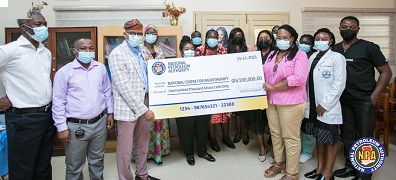The National Petroleum Authority (NPA) has presented a cheque for GH₵100,000 to the Korle-Bu Teaching Hospital (KBTH) to assist breast cancer patients at the National Radiotherapy Oncology and Nuclear Medicine Centre.
Dr Mustapha Abdul-Hamid, the Chief Executive Officer (CEO) of the NPA, who presented the cheque to the centre in Accra on Wednesday, said the donation formed part of NPA’s Ladies Association activities to mark October as breast cancer awareness month.
He said the Authority at the initial stage of the awareness creation of breast cancer invited experts from the National Radiotherapy Oncology and Nuclear Medicine Centre to educate its staff on breast and cervical cancer.
Dr Abdul-Hamid noted that the NPA as part of activities to mark the breast cancer awareness month organised breast screening and health walks for its staff across the country.
He, therefore, pledged the Authority’s support in providing additional financial assistance to the centre to deliver quality healthcare to needy patients of breast cancer.
For her part, the Deputy Director of the Centre, Dr Verna Vanderpuje, commended the NPA for the gesture and indicated that it was the first time the centre had received such an amount as a donation to support the treatment of patients at the centre.
She stressed that the presentation would go a long way to support the treatment of patients and appealed for additional funding, which according to her, was very crucial in aiding patients to fully complete their treatment procedures.
Dr Vanderpuje professed that because of the expensive nature of cancer treatment, most patients often abandoned their session midway and reappeared when their situations had worsened.
This, she said led to high mortality rates and called on individuals and stakeholders to support the centre in caring for the growing number of needy patients.
BY ABIGAIL ARTHUR

